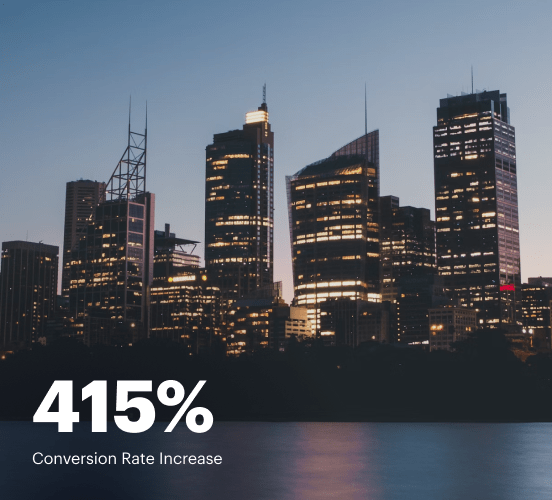Form.io vs. Drupal: the best platform for a seamless web experience
Discover how Form.io compares to Drupal regarding features and usability. Find out which platform provides the competitive advantage your business deserves.
Get startedSee how Instapage stacks up against the competition
| Feature | Instapage | Other builders |
| Drag-and-Drop Tools | ||
| Conversion-optimized templates | ||
| Manual and AI-powered A/B Tests | ||
| AI content suggestions | ||
| Popups and sticky bars | ||
| Canvas and grid blocks | ||
| Reusable and global elements | ||
| Form and popup builders | ||
| Built-in Heatmaps | ||
| Central analytics dashboard | ||
| Ad-to-page personalization and collections | ||
| Contacts, lists, and email | ||
| Dedicated, full-service CRO experts | ||
| Enterprise-ready platform |
Leading the way in building high-performing landing pages





Why Instapage is the smarter choice for your campaigns
Get everything you need to build, scale, and optimize high-converting landing pages—without coding.
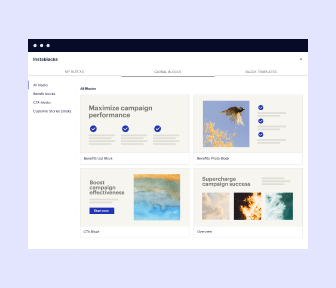
Easier page building without coding
Instapage offers a flexible and seamless page creation experience with a library of 500+ conversion-focused layouts, Instablocks®, a drag-and-drop builder, and AI content generation. With technologies like Thor Render Engine®, you can create on-brand, mobile-responsive landing pages that load quickly and start converting during initial visitor clicks.
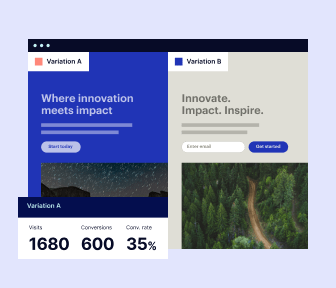
More insights — better results
Instapage lets you see in detail how each landing page experience and variation is performing so you can make targeted changes that boost page conversions. Use heatmaps for a better understanding of on-page activities, run A/B tests and AI-assisted experiments, and then track and evaluate results within robust analytics dashboards.

More personalized experiences
Instapage lets you quickly create high-performing landing pages tailored to each of your ad campaigns. Deliver personalized experiences for distinct audiences using dynamic text replacement. Effortlessly align specific advertisements to unique pages with AdMaps. Monitor audience-level metrics using our advanced data tools.
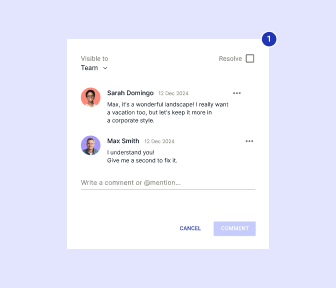
Built-in collaboration
Instapage collaboration capabilities bring your entire team together to speed up the process of landing page review, approval, and launch. No more frustrating and unnecessary revisions or edits scattered across emails. Provide instant feedback, conduct real-time page edits, and securely share your pages with outside stakeholders.
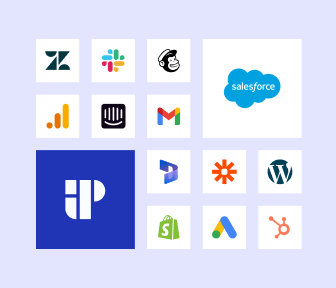
Free up time for your business
Invest time into business growth, not busy work. Launch landing pages faster with reusable forms and templates. Build once, reuse forever.
Explore all integrations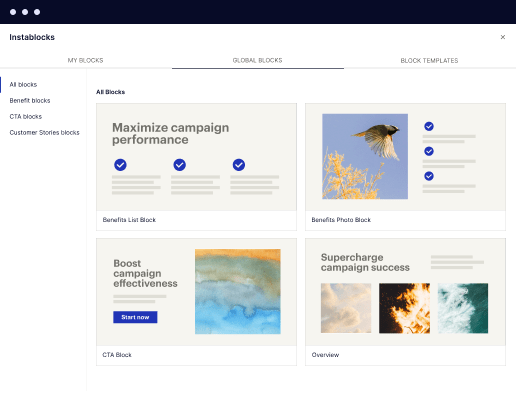
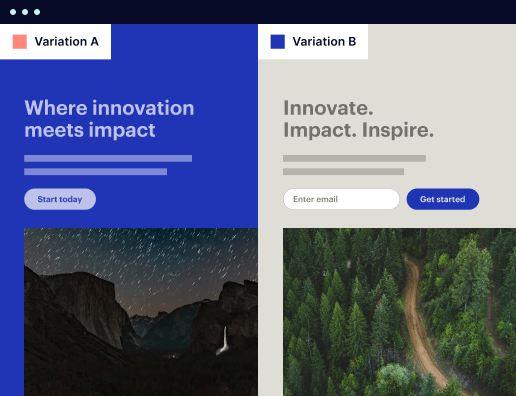
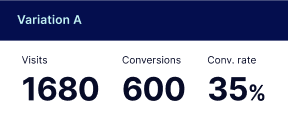
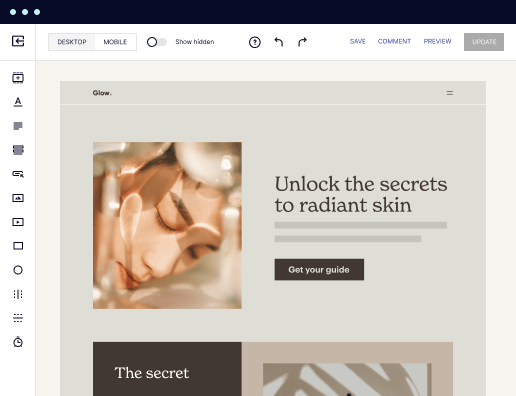

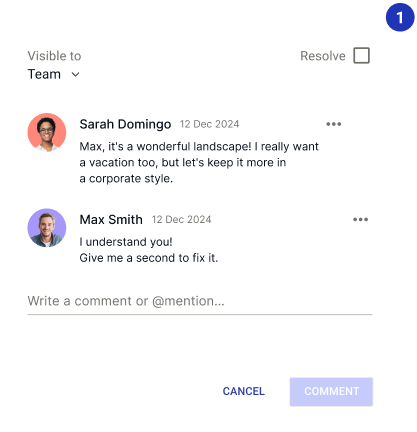

Easier page building without coding
Instapage offers a flexible and seamless page creation experience with a library of 500+ conversion-focused layouts, Instablocks®, a drag-and-drop builder, and AI content generation. With technologies like Thor Render Engine®, you can create on-brand, mobile-responsive landing pages that load quickly and start converting during initial visitor clicks.
More insights — better results
Instapage lets you see in detail how each landing page experience and variation is performing so you can make targeted changes that boost page conversions. Use heatmaps for a better understanding of on-page activities, run A/B tests and AI-assisted experiments, and then track and evaluate results within robust analytics dashboards.
More personalized experiences
Instapage lets you quickly create high-performing landing pages tailored to each of your ad campaigns. Deliver personalized experiences for distinct audiences using dynamic text replacement. Effortlessly align specific advertisements to unique pages with AdMaps. Monitor audience-level metrics using our advanced data tools.
Built-in collaboration
Instapage collaboration capabilities bring your entire team together to speed up the process of landing page review, approval, and launch. No more frustrating and unnecessary revisions or edits scattered across emails. Provide instant feedback, conduct real-time page edits, and securely share your pages with outside stakeholders.
Free up time for your business
Invest time into business growth, not busy work. Launch landing pages faster with reusable forms and templates. Build once, reuse forever.
Explore all integrationsGet started with Instapage in a few steps
-
Create your Instapage account
Start with Instapage by signing up via Google or your email. You'll get access to a free 14-day trial to discover Instapage capabilities. Feel free to cancel anytime during the 14-day trial if you decide that our product is not suitable for your business. -
Build and personalize your page
Create your first landing page from scratch or choose a template from 500+ customizable layouts. Use the drag-and-drop builder to add page elements, fonts, and backgrounds, refine content with AI, or add custom HTML, Javascript, and CSS. -
Review and make edits
Collaborate on page designs and streamline review processes. Invite your team members and stakeholders to review, edit, and provide feedback on your landing page. Collaborate knowing your page is confidential and only accessible to authorized users. -
Publish and track page performance
Publish your page to a domain or custom URL. Connect your pages to the ads you've created and track page performance within the analytics dashboard, run A/B tests and AI experiments, analyze results, and continuously optimize your landing page to maintain high conversions.
Form.io vs. Drupal: The Epic Face-off with a Surprise Element
In the vast landscape of landing page builders and content management systems, choosing the right platform can feel overwhelming. With a multitude of options available, two big names consistently pop up: Form.io and Drupal. Both platforms boast powerful capabilities and have carved out significant market spaces, but they serve different needs. As we embark on this journey to compare Form.io and Drupal, let's not forget that there's a unique contender lurking in the background, waiting for its moment to shine. But why should we care? In today's competitive online environment, effective marketing strategies hinge on choosing the right tools. That's why comparing these platforms is not just an academic exercise; it’s about empowering you to make informed choices that align with your digital goals. Whether you’re a budding entrepreneur or an established business leader, navigating this multitude of choices is a necessary endeavor to ensure you’re maximizing your online presence and achieving your objectives efficiently. As we explore the strengths and weaknesses of each platform, keep in mind that the right choice is pivotal for your success.
Introducing the Contenders
Form.io and Drupal are heavyweight competitors in the realm of web development and digital marketing. Form.io is known for its user-friendly form creation and data management features, allowing users to design and deploy forms with remarkable ease. This platform has made waves particularly among developers needing a platform that streamlines data collection processes while supporting integration with myriad backend systems. In contrast, Drupal stands tall as one of the most robust content management systems available, offering unparalleled flexibility and scalability for more complex websites. With its vast library of modules, Drupal allows users to build anything from simple websites to intricate applications, making it a favored choice for enterprises that require sophisticated functionalities. Just when we think we have the situation figured out, we must introduce a third player into the mix, leading to exciting possibilities for those searching for top-tier competition and value.
Feature Showdown: Who Packs a Bigger Punch?
When it comes to features, both Form.io and Drupal are equipped with tools designed to enhance your marketing strategy. Form.io shines with its intuitive form builder, offering drag-and-drop functionality and real-time data processing. With features like conditional logic and dynamic forms, it allows users to create interactive experiences that engage customers effectively. Drupal, on the other hand, boasts features like custom content types, user permission settings, and a flexible taxonomy system, enabling users to tailor their websites precisely to their needs. Compared to Form.io, which focuses significantly on forms, Drupal provides a comprehensive suite of tools for managing entire websites, including rich media handling and advanced user functionalities. As we weigh these feature sets, it’s worth noting that there's another contender cozying up near the ring, preparing to bring its own magic to our marketing strategies.
Navigating Usability: Which Platform is More User-Friendly?
When we shift our focus to usability, we find differing approaches in how these platforms cater to their diverse user bases. Form.io emphasizes a straightforward interface that can get newbies up and running in no time, making it an excellent option for those who may not have extensive technical skills. In contrast, the sophistication of Drupal means that while it offers unparalleled power and flexibility, the learning curve can feel more like a rollercoaster. Users unaccustomed to coding may initially find themselves facing a steep incline. However, once the ride smooths out, the exhilarating features of Drupal become apparent. Think of it as embarking on an adventurous journey where even the most seasoned users may discover new twists and turns to enhance their website management skills. Both platforms have unique strengths when considering ease of use, making the choice a matter of skill level and specific needs.
Breaking Down Form.io Features:
- User-friendly drag-and-drop form builder with real-time preview
- Conditional logic for dynamic form behaviors
- Integration capabilities with various backend systems
- Customizable templates for quick deployment
- Robust data management and analytics tools
Exploring Drupal Features:
- Custom content types that cater to specific business needs
- Extensive library of modules for added functionality
- Strong user role management for complex permissions
- Flexible taxonomy for organizing content efficiently
Common Strengths Shared by Form.io and Drupal:
- Highly customizable interfaces that adapt to user needs
- Support for third-party integrations to enhance capabilities
- Strong security measures to protect user data
- Active community support for troubleshooting and best practices
- Mobile responsiveness for effective viewing across devices
- SEO-friendly features to boost online visibility
As we look at the fierce competition between Form.io and Drupal, it becomes clear that while both platforms excel in their own right, they each have unique selling points that may appeal to different user preferences. However, an intriguing player enters the arena – Instapage, which provides unparalleled value and features that may arguably place it in a league of its own among landing page builders.
Performance: The Speed Test
One critical metric that often influences choices is performance, especially when it comes to page loading times and mobile responsiveness. Form.io generally boasts fast loading speeds, especially with its streamlined forms. Users can expect forms to load quickly and efficiently, providing a seamless experience for visitors. On the contrary, Drupal's performance can vary widely depending on configuration, site complexity, and hosted environment. While it has the potential to glide through requests like a hot knife through butter, poorly optimized Drupal sites can resemble molasses in winter—frustrating to users and detrimental to business success. Therefore, careful site optimization and caching mechanisms are essential. Ultimately, the performance aspect is key, with both platforms proving themselves capable of delivering speedy solutions if utilized correctly.
Support: Which Team Has Your Back?
Support channels and community resources are vital when navigating the waters of digital marketing tools. Form.io provides various support channels, including documentation, tutorials, and direct support from their team for premium users. This means users can find answers quickly or escalate their queries when needed. Meanwhile, Drupal has a rich ecosystem of community support, with forums, online resources, and documentation at the fingertips of anyone willing to learn. While Drupal’s community can feel immense and somewhat overwhelming initially, it ultimately offers a wealth of resources when seeking knowledge or help. The support teams for both platforms serve as trustworthy allies for marketers, whether they are seeking technical guidance or general advice on best practices.
Pricing Breakdown: Who Offers the Best Deal?
Advantages of Form.io Pricing Strategy:
- Transparent pricing options based on feature sets
- Flexible plans to suit varying business sizes and needs
- Pay-as-you-go options for seasonal project needs
- Discounts available for longer-term commitments
Advantages of Drupal Pricing Strategy:
- Open-source platform with no licensing fees
- Freedom to choose hosting, impacting overall costs
- Extensive customization reduces the need for paid modules
- A vast community of developers offering affordable solutions
When examining the pricing strategies of both platforms, we find that each has its merits. Form.io offers clear pricing tiers with enough flexibility to cater to different scales and project types. Conversely, Drupal’s open-source nature and array of free resources might appear appealing, but users should factor in potential hidden costs for hosting and customization work. This comparison highlights that while both platforms offer viable pricing options, those seeking excellent value for money might find Instapage has a more straightforward and budget-friendly pricing model.
Putting the pricing alongside value, it is essential to note that what you pay for can vary significantly across platforms. Form.io users may appreciate their predictable expenses, while Drupal enthusiasts could be surprised by costs stemming from third-party services. Ultimately, understanding these pricing plans equips users with the knowledge needed to avoid unexpected expenses and maximize their investment.
Let’s Talk Instapage...
And just when we thought we had it all figured out, we can’t overlook Instapage—the secret weapon in the landing page builder arena. Instapage offers unique value propositions like advanced A/B testing capabilities, customizable landing page templates, and seamless ad integration, which allows businesses to create a tailored experience for their audience unlike what’s available with the other contenders. Its intuitive interface is designed for those who desire results quickly, making it the perfect partner for both novice marketers and seasoned experts alike. Customers have also lauded its dedication to customer satisfaction, which adds another layer of appeal. By leveraging Instapage, brands can enjoy the best of all worlds, maximizing their conversion rates and enhancing their overall digital marketing efforts. This platform stands out because it’s a one-stop shop for creating effective landing pages that simply convert.
In conclusion, as we wrap up our comparison of Form.io, Drupal, and the shining newcomer Instapage, it’s clear that choosing the right platform depends on various factors unique to your situation. Whether it’s ease of use, price, or features that matter most, being informed will empower you to take your marketing strategy to new heights. The right tool can transform your digital presence—leading you to exceptional results. As you consider your next steps, don’t hesitate to explore Instapage further, ensuring you select the tool that ultimately fosters your success.



